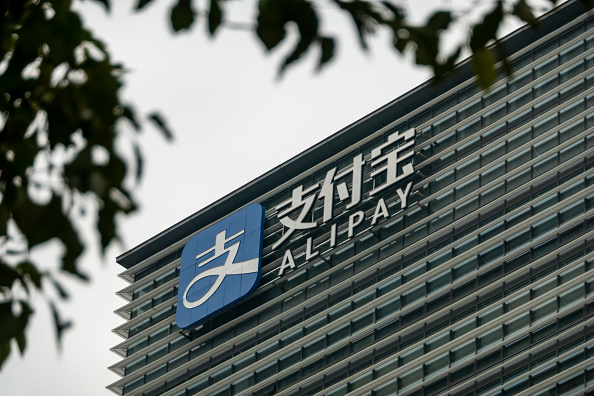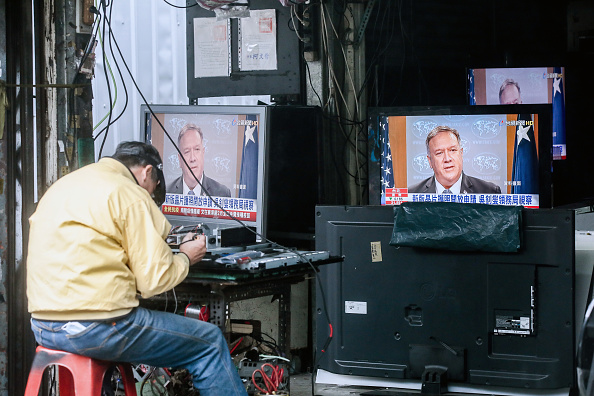
 Becoming a "Technological Superpower"
Becoming a "Technological Superpower"The Trump administration has opted not to ban American investment in Chinese tech giants Alibaba, Tencent, and Baidu, despite a contentious debate between the State Department and Treasury officials. But, the U.S. Defense Department has accused nine other Chinese firms of being owned or controlled by the Chinese military, and these companies will be subject to exclusions from American investment. The move comes as the Trump administration ends its term and prepares to transition power to President-elect Joe Biden.
As China and the United States continue to spar over regulations on foreign technology, Beijing is altering the technological landscape of the country. In recent months, China has released draft rules on various areas from antitrust to data protection, as part of efforts to regulate and restructure the country's largest tech firms. The moves have put the future of some of China's largest tech companies in question, including Alibaba and Ant Group. But the regulations are intended to increase data protection and enforce antitrust laws, experts say, and demonstrate a broader trend in China's attempt to become a "technological superpower," according to Kendra Schaefer, a partner at Trivium China. More on Ant Group from Joel Gallo, CEO of Columbia China League Business Advisory Co.
 Combatting COVID
Combatting COVIDTwo members of a team sent by the World Health Organization to investigate the origins of the coronavirus were barred from entering Wuhan, China after testing positive for coronavirus antibodies, while the other thirteen members were asked to quarantine in Wuhan for fourteen days. While in quarantine, the international team of experts from the United States, Australia, Germany, Japan, Britain, Russia, the Netherlands, Qatar and Vietnam, will start working with Chinese experts via video conference. Little is known about the origin of the virus, and the inquiry is expected to take months, if not longer.
Meanwhile, China has also experienced a new surge in coronavirus cases over the last month. Over 28 million people have been placed into lockdown, double the number impacted in the Wuhan lockdown last January. Crash testing sites were also deployed, and nearly every resident in the cities of Shijiazhuan and Xingtai was tested in a matter of days. The initial spread is thought to have started at a village wedding party, and overall the number of cases in China remain small. On Wednesday, China's National Health Commission reported a total of 115 new confirmed cases on the mainland, the highest daily increase since July 30.
As China attempts to contain further spread ahead of next month's Lunar New Year holiday, when hundreds of millions of Chinese typically travel to their hometowns, more developing countries are beginning to report results on the efficacy of China's coronavirus vaccine. Brazilian researchers reported that the vaccine's efficacy may be just above 50% when including mild cases, lower than the 78% initially reported that included only moderate and severe cases, while trials in Turkey and Indonesia reported results ranging from 65-91%. Experts say piecemeal results could undermine confidence in the vaccine in the developing world. Indonesia's findings, however, were sufficient for the country to become the first outside of China to approve it for emergency use.
 Transitional Moves
Transitional MovesOutgoing U.S. Secretary of State Mike Pompeo announced this week that Washington would be lifting regulations on Taiwan, effectively ending decades-long restrictions on contact between officials in Washington and their counterparts in Taipei. A spokesperson from the Biden transition team said in response that the incoming Biden administration will continue to support "a peaceful resolution of cross-strait issues consistent with the wishes and best interests of the people of Taiwan."
China condemned the decision, saying it was "resolutely opposed" to the move, which was made within the final week of the Trump administration's term. The Taiwan Foreign Minister said that relations with the U.S. have now been elevated to a "global partnership." Despite the lifting of restrictions, U.S. Ambassador to the United Nations Kelly Craft's trip to Taiwan was cancelled by the State Department this week, as part of an overall grounding of foreign travel by diplomats in the final week of the Trump administration.
President-elect Biden is also solidifying his top picks for China-related posts, and has named former Obama official Kurt Campbell as the new Indo-Pacific coordinator at the National Security Council . Campbell, who served as the U.S. assistant secretary of state for East Asian and Pacific Affairs, is credited with leading Obama's "pivot to Asia" initiative, and is tasked with reinvigorating Washington's relationship with the Asia-Pacific. Laura Rosenberger, a State Department and White House veteran, and former Hillary Clinton advisor, was tapped as the National Security Council's Senior Director for China, and will report to Campbell. For more on the future of the bilateral relationship, read "Why Subnational Interests Matter," by Cheng Li, Director of the John L. Thornton China Center at The Brookings Institution, and Xiuye Zhao, Director for Asia Operations at the State Legislative Leaders Foundation.
Prepared by China-US Focus editorial teams in Hong Kong and New York, this weekly newsletter offers you snap shots of latest trends and developments emerging from China every week, while adding a dose of historical perspective.
- 2021-01-08 Capital Chaos
- 2020-12-18 All Eyes on 2021
- 2020-12-12 Midwest to Middle Kingdom?
- 2020-12-04 Shifting Winds
- 2020-11-21 Multilateralism on the Move
- 2020-11-14 Staying Tough
- 2020-11-07 Battleground Ballots
- 2020-10-30 Knock Knock
- 2020-10-24 Looking Back and Moving Forward
- 2020-10-16 COVID Cluster
- 2020-10-10 Election Looming
- 2020-10-03 Golden Week Kicks Off
- 2020-09-26 Virtual Diplomacy
- 2020-09-18 Digital Domain
- 2020-09-12 Reframing the Ground Rules
- 2020-09-05 Reciprocity in Action
- 2020-08-29 Who’s Tougher on China?
- 2020-08-22 To Talk, Or Not To Talk
